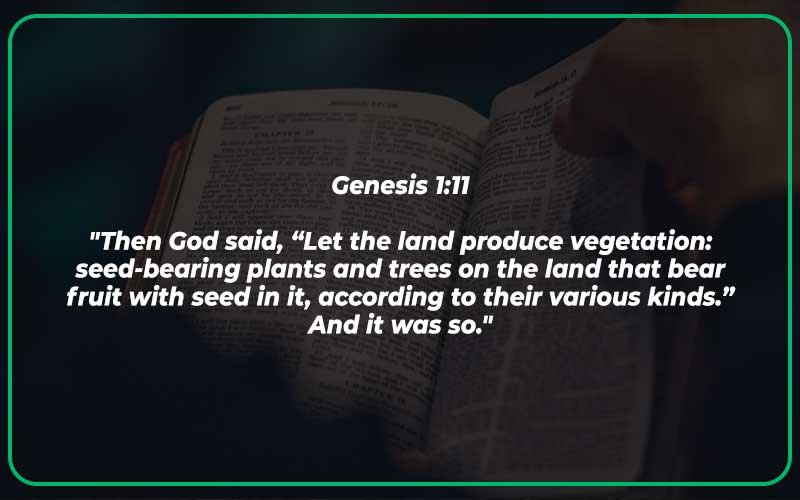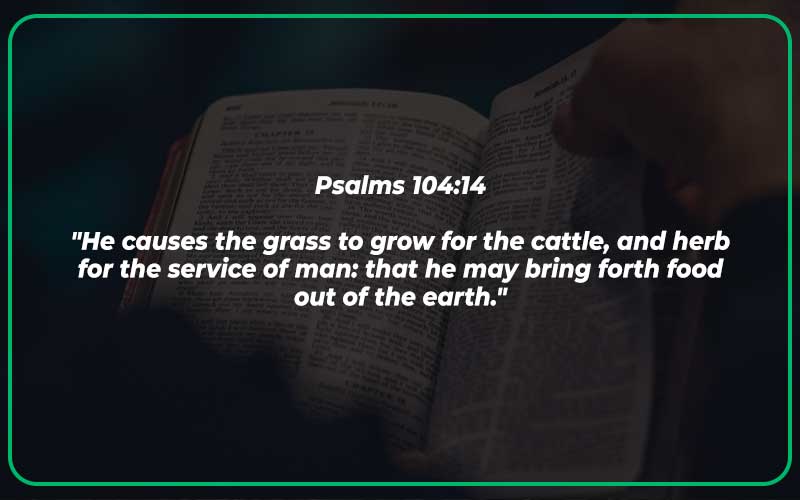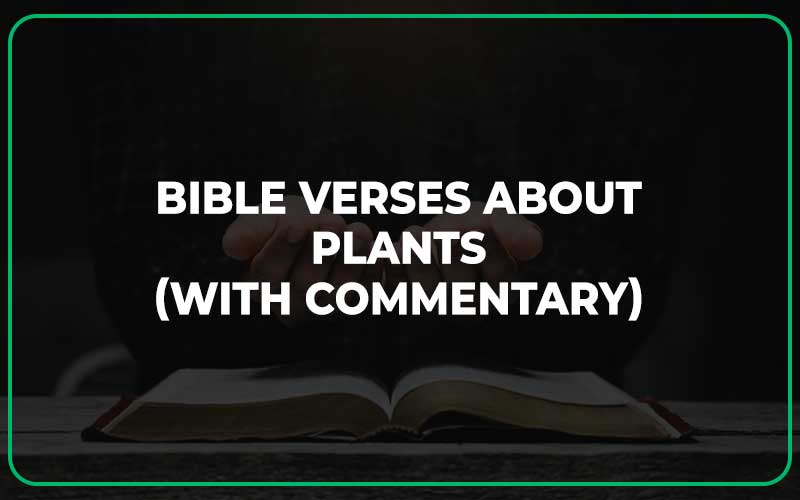The Bible is full of beautiful and poignant passages about nature, including plants. These verses remind us of the wonder and importance of the plants that surround us, and of their spiritual significance.
Whether you have a green thumb or just appreciate the beauty of nature, these Bible verses about plants are sure to lift your spirit and deepen your understanding of God’s creation.
Bible Verses About Plants
Genesis 1:11
“Then God said, “Let the land produce vegetation: seed-bearing plants and trees on the land that bear fruit with seed in it, according to their various kinds.” And it was so.”
This verse highlights the significance of plants in God’s creation. From the very beginning, God designed the land to produce vegetation, showcasing His intention for plants to play a vital role in sustaining life. This verse also emphasizes the diversity of plants, with each kind having its own unique characteristics and purpose.

Genesis 2:9
“The LORD God made all kinds of trees grow out of the ground—trees that were pleasing to the eye and good for food. In the middle of the garden were the tree of life and the tree of the knowledge of good and evil.”
God’s intention for plants goes beyond their practical uses. In the Garden of Eden, God created trees that were both visually appealing and provided nourishment. The inclusion of the tree of life and the tree of the knowledge of good and evil shows that plants can also symbolize important spiritual aspects.
Psalm 1:3
“They are like trees planted by streams of water, which yield their fruit in its season and their leaves do not wither. In all that they do, they prosper.”
This beautiful illustration compares a righteous person to a healthy and flourishing tree planted by a constant water source. It depicts the fruitful and blessed life of an individual who finds nourishment in God’s Word and follows His ways. Just as trees need water to thrive, we need to continuously draw from God’s wisdom and grace to succeed in all areas of life.
Psalm 92:12-14
“The righteous will flourish like a palm tree, they will grow like a cedar of Lebanon; planted in the house of the LORD, they will flourish in the courts of our God. They will still bear fruit in old age, they will stay fresh and green.”
This metaphorical depiction emphasizes the spiritual and personal growth of the righteous. Like sturdy palm trees and majestic cedars, the righteous individuals who dwell in God’s presence and seek Him diligently will flourish and remain vibrant throughout their lives. Their lives will bear the fruit of righteousness, even in their old age, as they continue to rely on God’s strength and guidance.
Matthew 13:32
“Though it is the smallest of all seeds, yet when it grows, it is the largest of garden plants and becomes a tree, so that the birds come and perch in its branches.”
This parable of Jesus illustrates the remarkable growth and impact of God’s Kingdom. Though the mustard seed is tiny, it grows into a large tree that provides shelter and rest for birds. Similarly, God’s Kingdom starts small and inconspicuous but grows to encompass and bless many. It emphasizes that no act of faith or service is too small, as God can use it to bring about significant transformations.
Luke 6:44
“Each tree is recognized by its own fruit. People do not pick figs from thornbushes, or grapes from briers.”
This verse teaches us the importance of discerning the character and authenticity of others by observing their actions and the outcomes they produce. Just as we can distinguish different trees by their fruits, we can evaluate people’s intentions and qualities by assessing the effects of their words and behaviors. It calls us to cultivate good fruits in our own lives and encourages us to associate with those whose fruits align with godliness.
John 12:24
“Very truly I tell you, unless a kernel of wheat falls to the ground and dies, it remains only a single seed. But if it dies, it produces many seeds.”
Jesus uses the analogy of a kernel of wheat to explain the concept of sacrifice and multiplication. Just as a seed must die and be buried in the ground to produce a bountiful harvest, so too must believers be willing to die to their selfish desires and personal agendas. Through this sacrificial surrender, their lives can bear much fruit and impact the lives of others for God’s glory.
Romans 11:17
“But some of these branches from Abraham’s tree—some of the people of Israel—have been broken off. And you Gentiles, who were branches from a wild olive tree, have been grafted in. So now you also receive the blessing God has promised Abraham and his children, sharing in the rich nourishment from the root of God’s special olive tree.”
This verse presents the imagery of plant grafting to illustrate the Gentile believers’ inclusion in God’s blessings. Wild olive branches, representing the Gentile believers, are grafted into the cultivated olive tree, symbolizing the people of Israel. It highlights God’s plan of redemption that extends to all who put their faith in Jesus Christ, regardless of their background, and emphasizes unity and the shared inheritance of believers.
1 Corinthians 3:6-7
“I planted the seed, Apollos watered it, but God has been making it grow. So neither the one who plants nor the one who waters is anything, but only God, who makes things grow.”
These verses remind us of our role as God’s co-workers in His Kingdom. Some may sow the seed of the Gospel, while others water it through teaching and discipleship. However, ultimately, it is God who enables growth and brings forth transformation in people’s lives. It humbles us and reminds us that we are mere instruments in God’s hands, highlighting the central role of God’s power and grace in the process of spiritual growth.
Galatians 6:7
“Do not be deceived: God cannot be mocked. A man reaps what he sows.”
This verse emphasizes the principle of sowing and reaping. Just as in agriculture, where a farmer will reap the produce planted in the field, our actions and choices have consequences. It reminds believers to be intentional and responsible for their conduct, knowing that they will experience the outcomes resulting from their deeds. It serves as a warning against deceiving oneself or trying to manipulate God, as He sees and responds to the genuineness of our hearts.
Ephesians 4:15
“Instead, speaking the truth in love, we will grow to become in every respect the mature body of him who is the head, that is, Christ.”
This verse urges believers to speak the truth within the context of love and to prioritize growth towards spiritual maturity. It highlights the importance of genuine communication, rooted in love and grounded in God’s Word. By doing so, believers can experience personal growth and contribute to the spiritual development of the body of Christ, collectively reflecting the character of Jesus Christ, who is the head of the Church.
Colossians 2:6-7
“So then, just as you received Christ Jesus as Lord, continue to live your lives in him, rooted and built up in him, strengthened in the faith as you were taught, and overflowing with thankfulness.”
These verses encourage believers to remain deeply rooted in Christ and to live their lives in alignment with Him. Just as plants draw nourishment from their roots, we are called to draw strength and sustenance from our relationship with Jesus Christ. By staying grounded in Him, believers can grow in their faith, remain firm against challenges, and bear the fruits of gratitude and thankfulness.
James 1:21
“Therefore, get rid of all moral filth and the evil that is so prevalent and humbly accept the word planted in you, which can save you.”
James reminds believers to rid themselves of moral impurity and to humbly receive God’s Word, which has the power to bring about transformation and salvation. This verse encourages believers to embrace the purity of God’s truth and to allow it to take root in their hearts. By doing so, they can experience the saving work of God and be transformed into vessels that honor and reflect His righteousness.
Psalms 104:14
“He causes the grass to grow for the cattle, and herb for the service of man: that he may bring forth food out of the earth.”
This verse highlights God’s provision for both animals and humans through the growth of vegetation. It intricately showcases the interdependence and interconnectedness of God’s creation. It reminds believers of God’s faithful provision and His divine design, which meets the needs of all living creatures and sustains the intricate balance of life on earth.

Isaiah 35:1-2
“The wilderness and the dry land shall be glad; the desert shall rejoice and blossom like the crocus; it shall blossom abundantly and rejoice with joy and singing.”
This poetic verse portrays the transformation and restoration God brings to barren and desolate places. The wilderness and dry land, often symbolic of hopelessness and desolation, will flourish and bloom abundantly. It serves as a metaphor of God’s power to bring new life, joy, and beauty to the most unforeseen circumstances. It gives hope to believers, assuring them that God can turn their seemingly hopeless situations into fruitful and joyful experiences.
Jeremiah 17:7-8
“But blessed is the one who trusts in the LORD, whose confidence is in him. They will be like a tree planted by the water that sends out its roots by the stream. It does not fear when heat comes; its leaves are always green. It has no worries in a year of drought and never fails to bear fruit.”
This verse paints a powerful picture of the believer who trusts in the Lord, comparing them to a tree firmly rooted by a water source. Such individuals remain confident, unwavering, and unafraid, even in times of adversity and drought. They draw from the unfailing stream of God’s provision and guidance, resulting in a continuous display of spiritual vitality, strength, and fruitfulness.
Matthew 7:16-17
“By their fruit you will recognize them. Do people pick grapes from thornbushes, or figs from thistles? Likewise, every good tree bears good fruit, but a bad tree bears bad fruit.”
Jesus emphasizes the importance of assessing people’s true character and authenticity by observing the fruits of their lives. Just as a good tree produces good fruit and a bad tree produces bad fruit, people’s actions and attitudes reveal their true nature. It encourages believers to cultivate godly character and bear good fruits in their own lives while discerning the genuineness of others. It serves as a reminder that our lives should consistently reflect Christ’s nature, and our actions should align with our professed faith.
Mark 4:8
“Other seed fell into good soil and brought forth grain, growing up and increasing and yielding thirtyfold and sixtyfold and a hundredfold.”
This parable of the sower highlights the significance of fertile and receptive hearts in producing a bountiful harvest. Just as good soil enables the seed to grow and produce abundant crops, a heart open to the Word of God bears fruit in various measures. It encourages believers to cultivate hearts that are receptive, responsive, and responsive to God’s Word, recognizing that the depth and quality of their relationship with God ultimately determine the level of spiritual fruitfulness they will experience.
John 15:4-5
“Abide in me, and I in you. As the branch cannot bear fruit by itself, unless it abides in the vine, neither can you, unless you abide in me. I am the vine; you are the branches. Whoever abides in me and I in him, he it is that bears much fruit, for apart from me you can do nothing.”
These profound words of Jesus highlight the importance of remaining deeply connected to Him in order to bear fruit. Just as branches draw their sustenance and life from the vine, believers are called to abide in Jesus, recognizing their total dependence on Him. It is through this intimate connection that believers can experience profound spiritual growth, bear abundant fruits of righteousness, and accomplish God’s purposes in their lives.
Acts 14:17
“Yet he did not leave himself without witness, for he did good by giving you rains from heaven and fruitful seasons, satisfying your hearts with food and gladness.”
This verse acknowledges God’s provision and goodness displayed through the cycles of rain and fruitful seasons. It reminds believers that every physical blessing they enjoy, such as food and joyful experiences, is a testimony of God’s faithfulness and loving care. It prompts gratitude and acknowledgment of God as the ultimate source of all blessings, both temporal and spiritual.
Revelation 22:2
“Through the middle of the street of the city; also, on either side of the river, the tree of life with its twelve kinds of fruit, yielding its fruit each month. The leaves of the tree were for the healing of the nations.”
This vision of the heavenly city in Revelation features the tree of life, symbolizing eternal satisfaction, healing, and wholeness. The twelve kinds of fruit and the healing properties of its leaves represent the abundance of God’s provisions and the restoration He brings to all nations. It serves as a powerful reminder that God’s ultimate plan is to bring complete healing and restoration to His creation, offering eternal life through a restored relationship with Him.
Also Read: 25+ Bible Verses About Our Identity in Christ (With Commentary)
What Does the Bible Say About Plants?
In the Bible, there are numerous references to plants, and they often carry symbolic and practical significance. These references offer insights into the natural world, human relationships with nature, and spiritual lessons. Let’s explore some key themes and ideas regarding plants in the Bible.
1. Creation and Provision: In Genesis 1:11-12, God creates plants on the third day of creation, emphasizing their importance for sustenance and beauty. God’s provision for humanity includes plants as a source of food (Genesis 1:29) and clothing (Genesis 3:7).
2. Parables and Symbolism: Jesus frequently used agricultural parables involving plants to convey spiritual lessons. The parable of the sower (Matthew 13:1-23) illustrates how the “seed” of God’s word grows in different hearts. The mustard seed parable (Matthew 13:31-32) teaches about the Kingdom of Heaven’s growth from a small beginning.
3. Metaphors for Growth: In Psalm 1, the righteous person is compared to a tree planted by streams of water, bearing fruit in its season. This metaphor highlights the importance of a strong foundation in faith and a life of righteousness.
4. Cursing and Healing: Plants are also mentioned in stories of divine punishment and healing. The story of the fig tree withering (Matthew 21:18-22) underscores the importance of genuine faith. The use of plants for medicinal purposes is implied in passages like Ezekiel 47:12 and Revelation 22:2, where the leaves of the trees are for the healing of the nations.
5. God’s Glory in Nature: The beauty and intricacy of plants testify to God’s creative glory. Romans 1:20 mentions how God’s invisible qualities can be understood through what has been made, including the natural world.
6. Gardens: Gardens are significant settings in the Bible, from the Garden of Eden to the Garden of Gethsemane. These locations carry spiritual weight, representing both the innocence lost through sin and the place of Jesus’ agony and surrender.
7. Trees of Life: The concept of the “tree of life” appears in Genesis 2:9 and Revelation 22:2, symbolizing eternal life and communion with God.
Overall, the Bible’s treatment of plants reflects the interconnectedness of nature, humanity, and spirituality. It teaches us about God’s provision, the growth of faith, and the symbolism of the natural world. These references to plants offer valuable lessons and insights that continue to resonate with believers today.

